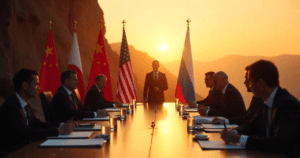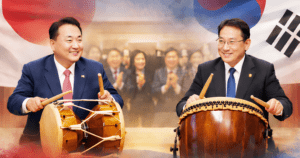In a political climate known more for confrontation than conciliation, a quiet thaw is taking shape. Over the past six months, President Donald Trump—long seen as one of Iran’s fiercest critics—has subtly pivoted toward diplomacy. The shift, though tentative, has opened new channels not only between Washington and Tehran but also hinted at renewed engagement with Ottawa. At the heart of this evolution lies a question that has confounded global powers for decades: can Iran truly be brought back into the fold through peaceful nuclear cooperation?
Trump’s Calculated Shift
Since April 2025, five rounds of nuclear talks between the U.S. and Iran have taken place, with the latest in Rome. Though tensions remain—particularly around Iran’s uranium enrichment activities—the rhetoric has cooled. Trump, who once tore up the Joint Comprehensive Plan of Action (JCPOA), now describes the negotiations as “moving along in the right direction.”
Trump’s current stance is less about idealism and more about pragmatism. A second war in the Middle East, especially against a country with asymmetric capabilities like Iran, is politically undesirable. He has made it clear in recent briefings that while American strength must never be questioned, “we can win better with deals than we can with drones.”
This shift, some argue, is as much about containing Israel’s more aggressive leanings as it is about achieving nonproliferation. Prime Minister Benjamin Netanyahu has issued increasingly direct warnings, calling any progress by Iran on nuclear enrichment a “red line.” Recent leaks suggest that Israeli defense forces are preparing contingency plans to strike Iranian facilities if diplomacy collapses.
Iran’s Diplomatic Reboot with Canada
In a surprising move, Iran has also expressed willingness to restore diplomatic relations with Canada, severed in 2012 over concerns about Tehran’s nuclear ambitions and human rights record. Iranian officials have said they are open to resuming dialogue—if Canada initiates the effort.
The timing is notable. Canada, with its strong international reputation for transparency, has a peaceful nuclear program governed by the Canadian Nuclear Safety Commission and closely coordinated with the International Atomic Energy Agency (IAEA). Its CANDU reactors, designed for civilian energy use, are considered a model of how nuclear power can be harnessed without weapons-grade enrichment.
Ottawa has not commented officially, but analysts speculate that Canadian re-engagement could serve as a non-confrontational bridge—giving Iran access to peaceful technology under rigorous safeguards, with Washington’s tacit approval.
A Canadian Path Forward?
Bringing Canada into the fold may be Trump’s way of adding credibility to a broader proposal: if Iran insists on its right to nuclear energy under the Non-Proliferation Treaty, why not do it the Canadian way?
This could entail Canadian engineers, regulators, and technicians assisting in the construction and oversight of nuclear power infrastructure in Iran—but with fuel sourced externally and enrichment strictly limited or relocated. It would mirror frameworks used in South Korea, Japan, and other nations where peaceful nuclear programs thrive without threatening regional stability.
In a recent social media post, Trump hinted at this idea: “Iran says it wants energy not war. Ok. Then let’s help them do it right. No bombs, just business.”
Israel’s Tightrope
The challenge, of course, is Israel. The Netanyahu government has long viewed Iran’s nuclear ambitions as existential. And while Jerusalem may accept temporary freezes or token oversight, anything that even hints at legitimizing Iran’s enrichment capacity—or its regional influence—remains anathema.
Sources close to Israeli defense circles indicate that air strike simulations have increased in recent weeks, particularly after reports that Iran is moving enriched uranium to secret locations to avoid detection. “We cannot afford another Vienna. This time, if we wait, it will be too late,” one Israeli military advisor warned privately.
This puts Washington in a bind. If Trump truly wishes to avoid war, he must not only convince Tehran to comply with new transparency measures, but also persuade Israel that diplomacy is not appeasement.
Time for a New Approach?
Still, there’s a growing chorus—especially among energy experts and foreign policy realists—that the U.S. and its allies should try something different. The decades-long “maximum pressure” strategy has not dismantled Iran’s ambitions; it has merely driven them underground.
Bringing Iran into the global framework, through structured and verifiable partnerships with nations like Canada, might offer a better route. As one former U.S. diplomat put it, “You don’t stop a river by yelling at it—you build canals.”
There are precedents. South Africa once had a nuclear weapons program before reintegrating into the international community. Even Libya, before its descent into chaos, agreed to dismantle its WMD programs in exchange for normalized relations.
Could Iran follow a similar path, especially if economic relief, energy investment, and international recognition are on offer? That may be the gamble Trump is now willing to take.
Once Unthinkable
What was once unthinkable—a U.S. president calling for nuclear cooperation with Iran—now appears possible, albeit with significant caveats. Trump’s move is not without political risk, nor without fierce opposition from key allies like Israel. But if Canada becomes a neutral partner, offering technical oversight and legitimacy, it might just give Washington the buffer it needs to broker a new type of nuclear arrangement.
In the end, the question isn’t just whether Iran can be trusted. It’s whether the world is willing to construct a framework where trust, however limited, becomes more valuable than confrontation. If Trump succeeds, it won’t just be a political win—it will be a historical realignment.














